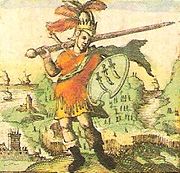
Aescwine of Essex
Encyclopedia

Old Saxony
Old Saxony is the original homeland of the Saxons in the northwest corner of modern Germany and roughly corresponds today with the contemporary Lower Saxony, Westphalia and western Saxony-Anhalt....
who in 527
527
Year 527 was a common year starting on Friday of the Julian calendar. At the time, it was known as the Year of the Consulship of Mavortius without colleague...
founded the Kingdom of Essex
Kingdom of Essex
The Kingdom of Essex or Kingdom of the East Saxons was one of the seven traditional kingdoms of the so-called Anglo-Saxon Heptarchy. It was founded in the 6th century and covered the territory later occupied by the counties of Essex, Hertfordshire, Middlesex and Kent. Kings of Essex were...
(in the area of modern-day England
England
England is a country that is part of the United Kingdom. It shares land borders with Scotland to the north and Wales to the west; the Irish Sea is to the north west, the Celtic Sea to the south west, with the North Sea to the east and the English Channel to the south separating it from continental...
approximately covered by the county of that name), becoming the first king of the region (r. c. 527-587 ?).
Precious little evidence is available for his existence. His name Æscwine first appears in a West-Saxon genealogy which is imperfectly preserved in London, BL, Add. MS 23211, presumably of the late 9th century. Here he is said to be father to King Sledd and himself a son of Offa, son of Bedca, son of Sigefugl, son of Swæppa, son of Antsecg, son of Gesecg, son of Seaxnet
Seaxneat
In Germanic mythology, Seaxnēat or Saxnōt is a god connected with the Saxons and, as recorded in Anglo-Saxons sources, their founder and ancestor. Seaxnēat appears in the genealogies of the kings of Essex. His name does not survive in any English placenames, although the element nēat in isolation...
(the legendary founder of the Saxons).
Further information is supplied by works of historians writing in the 12th and 13th centuries, who appear to have used pre-Conquest material, i.e. Henry of Huntingdon
Henry of Huntingdon
Henry of Huntingdon , the son of a canon in the diocese of Lincoln, was a 12th century English historian, the author of a history of England, Historia anglorum, "the most important Anglo-Norman historian to emerge from the secular clergy". He served as archdeacon of Huntingdon...
's Historia Anglorum, Roger of Wendover
Roger of Wendover
Roger of Wendover , probably a native of Wendover in Buckinghamshire, was an English chronicler of the 13th century.At an uncertain date he became a monk at St Albans Abbey; afterwards he was appointed prior of the cell of Belvoir, but he forfeited this dignity in the early years of Henry III,...
's Flores Historiarum and Matthew Paris
Matthew Paris
Matthew Paris was a Benedictine monk, English chronicler, artist in illuminated manuscripts and cartographer, based at St Albans Abbey in Hertfordshire...
's Chronica Majora. These, however, substitute the name Æscwine for Erkenwine or Erchenwine as Sledd's father. Both these names seem to betray Kentish connections.
On no known authority, Roger of Wendover and Matthew Paris state that Erkenwine founded the kingdom in 527 and reigned from that year to 587, when he died and was succeeded by his son Sledd. The reputed length of his reign appears unlikely for the time. Alternatively, genealogies included in the works of William of Malmesbury and John of Worcester (Chronicon B) make Sledd the first king of Essex and genealogies for Sigered and Swithred in Add. MS 23211 trace the line of East Saxon kings to Sledd.

